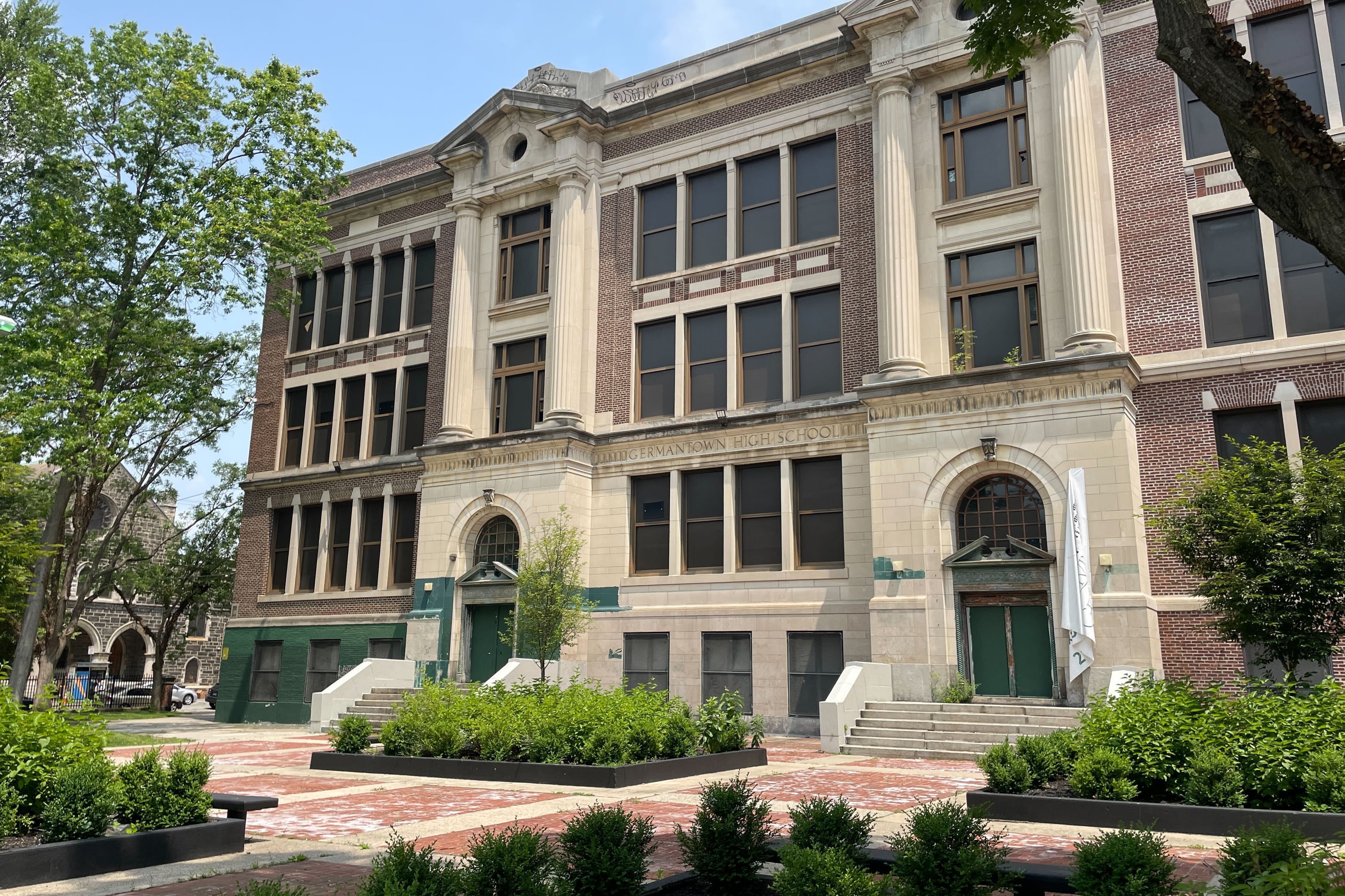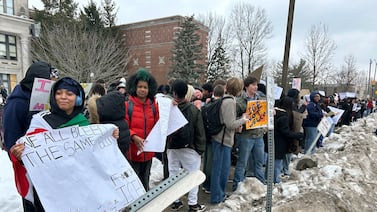Sign up for Chalkbeat Philadelphia’s free newsletter to keep up with news on the city’s public school system.
The Philadelphia school district has pledged that any future school closures — which officials have said are likely — will be markedly different from the last, brutal battle over shuttering local schools more than a decade ago.
Rather than impose the district’s closure plans onto Philadelphians, officials have said that moves to close, colocate, or repurpose schools would be guided by local community members and experts. They also pledged the process would be data-driven and transparent.
“This isn’t the district’s plan. This isn’t the Board of Education’s plan. This is Philadelphia’s plan,” Deputy Superintendent of Operations Oz Hill said at a November community meeting. “These are our children that have to live with this plan.”
But several parents and community leaders participating in the district’s formal advisory groups say the facilities planning process has already become opaque. After sitting through meetings filled with PowerPoint presentations that lack crucial financial or school-specific data, some advisory group members have called for an overhaul of the district’s approach and more clarity.
“It’s been extremely frustrating how little our input actually gets heard,” said Elaine Simon, former co-director of the Urban Studies program at the University of Pennsylvania and a member of the community leaders advisory group. “Meetings are overly structured and artificial, because we never get information or understanding of what their process actually is.”
Advisory group members said they took time off work and rearranged their schedules to attend the meetings, often scheduled for the middle of the day. But to Simon and several other members of the parent and community leader groups who spoke with Chalkbeat, the time has felt wasted by bureaucratic presentations and unspecific brainstorming sessions. Many worry the district is using them to add credibility to a flawed process, without considering their feedback about how to prevent closures in the first place.
The district’s final facilities plan is due in December, but the district has missed some of its own deadlines related to various parts of the process.
In an email, Alexandra Coppadge, the district’s chief of communications, said the district’s aim is to create a facilities plan that supports communities and student achievement, maximizes the use of school buildings, and provides more access to programs like prekindergarten and arts classes.
“The District is committed to completing a facilities plan that includes deep and thoughtful community engagement,” Coppadge said. She added that the district plans to host additional listening and community engagement sessions and will share more data in the coming months.
Since January, Simon and other advisory group members have met with district staff for an hour around once a month on Zoom, with one recent meeting scheduled in-person at the district office.
The advisory board members Chalkbeat spoke with emphasized that they want the process to go well. As the district tries to address a budget deficit, deteriorating infrastructure, and some school buildings with hundreds of empty seats, several members said they understand the district’s challenges and hope to contribute to a thoughtful solution.
“We do want a facilities plan,” Akira Drake Rodriguez, an assistant professor of city planning at the University of Pennsylvania and a member of one of the advisory groups, told the school board last month. “But we want one that prioritizes community needs and not just the district’s.”
Philadelphia district officials indicate school closures are likely
School districts across the country, including Denver and New York City, have been mulling school closures to cope with enrollment drops since the pandemic. But some people in those communities have urged districts to invest in their neighborhood schools and keep up regular building maintenance, rather than resort to closures.
Around 115,000 students now attend Philadelphia district schools, marking a 12% drop from a decade ago. Though enrollment grew slightly last year, several schools have hundreds of empty seats, while others are at capacity or are overcrowded.
District officials have said school closures are on the table. But they’ve stressed that they plan to avoid repeating the mistakes of the last round of closures in 2013, when 23 schools closed. That process decimated community trust in the city’s schools. And district officials readily admit it had a negative impact on students. The performance of displaced students declined, the performance of students attending schools where those displaced students were reassigned also declined, and student absences increased.
“It was not worth the cost,” Deputy Superintendent Hill told families last year.
This time, officials say the aim is to improve students’ learning environments, not just save money.
Last year, the board hired a public relations firm at the cost of $179,500 to facilitate community outreach and feedback sessions, and hosted more than 30 in-person public listening sessions. More than 500 people participated, according to the district. But several of those meetings that Chalkbeat attended consisted of mostly district representatives, with few parents or other members of the public in attendance.
Then, last November, the district launched its advisory group process, asking community leaders, parents, and educators across the city to attend regular meetings with district officials.
But those meetings have been extremely disappointing, Rodriguez told Chalkbeat. “We don’t ever get our questions answered,” she said.
Generally, advisory groups spent at least half of each meeting listening to district presentations of information that could mostly be found on its website, according to several group members Chalkbeat spoke with.
Though district representatives attended the meetings, several members echoed Rodriguez’s concern, saying their requests for more detailed information went unanswered.
Rodriguez said meetings have focused more on closing and colocating schools, instead of maintaining buildings. She wants the district to avoid closing schools entirely. Ultimately, she worries that her participation may be used to rubber-stamp a plan she does not agree with.
Other advisory members who don’t want closures say the focus on school closures and colocations in some meetings have made them worry the district has already decided that some closures are inevitable.
“At best, we are being given a window into a process,” said Adam Blyweiss, a member of the parent advisory group and a teacher at Jules E. Mastbaum High School. “At worst … we are being given the data-driven tools to effectively have us be the hatchet man instead of the district.”
School district behind on its own deadlines
The district has already missed some of its own deadlines to share key information, leaving advisory group members concerned that any proposal will be extremely rushed.
In May, the district was set to share a community update about its plans. But at that month’s board meeting, that didn’t happen.
Reporters were scheduled to receive a briefing about a new data website about the district’s facilities in April, with a public launch scheduled for Monday, April 7. The district told advisory group members that it would provide them with data in April too, according to an official document Chalkbeat obtained. But neither reporters nor advisory group members ever got access to the website. Advisory group members that Chalkbeat spoke to said their April meetings were cancelled.
Coppadge said the district plans to provide an update on the facilities planning process at its June board meeting. She said the district “held the release” of the data tool “in order to not disrupt our focus on accelerating academic achievement and state testing,” and that it plans to release the tool later this month.
Some advisory group members say that delay has undercut their ability to provide feedback and recommendations.
“We don’t have enough information,” said Kristen Goessling, director of participatory research at Pennsylvania State University and a member of one of the advisory groups. “Where is the data? What are we actually considering?”
Goessling said she understands that school closures are a sensitive issue. But she worries that the district’s concern about how it presents information could undermine its ability to form useful partnerships.
“I have more confidence than I can contain about us solving this problem,” said Goessling. “But we are not looked at as resources. We are looked at as obstacles.”
Mayor Cherelle Parker has also missed her own related deadlines. In December, Parker announced her administration would convene a committee of elected officials and labor and business representatives to review the district’s planning process. Parker said that committee would be formally introduced last winter. But today, no such committee exists.
The city’s Deputy Chief Education Officer Sharon Ward said in an email that Parker is “finalizing the membership list and intends to announce the group soon.”
The district has now begun gathering advisory group members in person at its headquarters.
Melanie Silva, a parent of a student at Rhawnhurst School who is also a member of the parent advisory group, attended the first round of those meetings on Monday. She said the meeting was the first time she saw preliminary data about potential schools that may be considered for closure or colocation. The district insisted information shared remain confidential.
Silva said it was useful to finally see some data, but it largely consisted of summary scores that rated the condition of buildings and the vulnerability of neighborhoods, without explaining what the scores were based on. It was the kind of information Silva thought the district would have prepared before starting its community engagement process.
To Silva, the experience leads to a bigger question about the district’s approach to potentially closing schools: “It’s like, do you want to be transparent or not?” she said. “Do you want people to know or not?”
Rebecca Redelmeier is a reporter at Chalkbeat Philadelphia. She writes about public schools, early childhood education, and issues that impact students, families, and educators across Philadelphia. Contact Rebecca at rredelmeier@chalkbeat.org.
Carly Sitrin is the bureau chief for Chalkbeat Philadelphia. Contact Carly at csitrin@chalkbeat.org.







